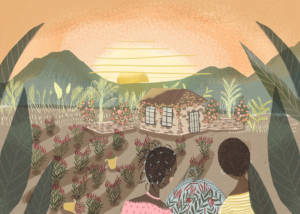At a Girls-Run Garden in Tanzania, JBFC is Sowing The Seeds of a Brighter Future
It was Chris Gates’ childhood dream to live and work in Tanzania as an exotic animal veterinarian, beginning with his humble desire to go on a safari. “My grandmother made a deal with me that in order for her to take me on safari, I had to volunteer in the community and see what Tanzania was really like,” he recalls, and in his freshman year of high school, Gates did just that. “I immediately fell in love with Tanzania and its communities,” he recalls, and it was this passion that led him to devote the rest of his high school summers to volunteering there and getting to know the culture, the language, and the unique challenges that the people in this particular region of East Africa face. One of the biggest challenges Gates noticed early on was that there was a huge gap in service for Tanzanian girls.
“At the time, there were about 6 to 8 other service organizations dedicated to working with boys, and not a whole lot was being done to help the girls,” Gates recalls. “So, I decided that I wanted to provide a refuge for orphan and street girls.”
The Janada L. Batchelor Foundation For Children, or JBFC, secured funds to start building their first house in May of 2006.
“It started very humbly,” Gates recalls, reflecting on the fact that when they started building on a tiny plot of land in 2007, they only had seven girls. We slowly realized as [the foundation] took on more girls and more responsibilities that we really needed to develop much more holistic care—we couldn’t just feed and clothe the girls and send them to a public school, because they were going to a public school with 900 students and only three teachers. They weren’t receiving quality education, so we wanted to start our own school in order to educate and empower them.”
The resulting Joseph & Mary campus has become a place where farming plays an integral role in daily life. Most Tanzanian children are the sons and daughters of farmers, and many of those farms don’t produce enough food for those children to eat. (Agriculture takes up 75% of the Tanzanian labor force, but it only produces 25% of the nation’s income.)
The idea for a permaculture farm at the school was born out of pragmatism and an understanding that nature can function as a vehicle for exploration and personal growth. The garden was designed as an outdoor classroom where science lessons could come to life. “Over the past 10 years now, we’ve developed this holistic model, so we’re still true to that,” says Gates, who further emphasizes the importance of self-sufficiency.
Today, the JBFC center has 46 girls in their home, and an 18-acre farm on which they now produce crops and livestock that feeds their students and sells at local markets. Gardening has provided ample opportunity for community outreach and engagement, as JBFC believes that in order to truly tackle poverty, Tanzania has to find solutions to growing its rural economy. “In 2013, we had permaculture consultant come over and help to redesign all of our gardens and livestock enclosures to make it more efficient in it’s replication of nature,” Gates says. There is also a head of the permaculture division who helps work with the girls and create the garden layout while teaching them what plants work together– skills that translate well into life outside of school.
At Joseph & Mary, the JBFC has almost 80 staff members, only three of which are international—an important ratio that keeps jobs and the empowerment that comes with them in the local community. “We wanted all of our management team to be East African,” Gates says. “We wanted this to be an organization for Tanzania by
So how does permaculture fit into this economic model?
“There is a big Indian population in this region of Tanzania, and part of JBFC’s goal is to help generate funds locally, without having to rely on international donations,” Gates points out. A portion of the peppers and other produce grown on the school’s farm is made into curries, spices, and other products that can be sold at the on-site restaurant for use in the local community. “We want to be able to raise money to grow, not just sustain.”
The girls started growing peppers to make hot sauce because there was a market demand for the product. Accordingly, the garden at the Joseph & Mary campus became a vehicle for personal growth and economic development. The team grows peppers, tomatoes, okra, potatoes, onions, pineapples, sugar cane, rice, corn, greens, bananas, oranges, mango, guava, papaya, and severals goats, cattle, turkeys, and other livestock.
“They are connecting with the community, and the garden is a way for the girls to realize that even though they have a rough background they’ve been given a lot, so they want to give back— and that’s a very empowering message.”
“A mix of girls and staff work to provide meat and produce to sustain our restaurant. The girls government is really the driving force behind the agricultural aspect. They sell to the restaurant, they sell to the staff, they have a big tomato patch and they do greens, and they also have about a fifth of the garden dedicated to families and giving away produce to other people in need. [The garden] is a community service area.”
“One of the things that’s also really big in Tanzanian culture is the funeral. Families need to provide food for the people that attend their funerals—and we’re talking hundreds of people. There are families and people in the community who can’t afford to provide this kind of food, so then they feel bad and it makes them look really bad for not being able to provide a proper meal to send off their loved ones. So, the girls have a garden with greens and vegetables that they can give to these families. They are connecting with the community, and it’s a way for the girls to realize that even though they have a rough background, they’ve been given a lot. They want to give back— and that’s a very empowering message.”
Members of the local community have also taken notice. “We let the girls do it, and the response has been very favorable,” says Gates of the garden’s donation program. “The village government constantly talks about how great and respectful our girls are.”
When we inquire about drought and the school’s perspective on growing organic or low spray, Gates is forthright: “We actually had a really good rainy season this year. We’re fortunate in that we’re on the shores of Lake Victoria, so we can irrigate.
And as far as pests, we have some, but not a ton. We’re not inundated. We’re pretty organic, but we can also use organic pesticides like tobacco leaves, neem, and garlic to mitigate having to use chemical additives.”
“Our reality is that we have 330 students and 76 staff each day that have two meals, plus all of our residents who have dinners and weekend meals, and we have to feed them. So, if something doesn’t grow very well, then we have to find out how to make it work.”
And what is the garden’s best crop?
“We do a ton of beans—the staple bean in Tanzania is similar to a pinto bean, and we also grow black beans because that is a more niche crop: we sell it to the ex-pat communities like the local Indian population, and we also use it in several recipes in our restaurant, which we sell at a higher price so that we can buy more beans.
After planting any crop we also plant beans to fix the soil— so there are permaculture practices in place. For the last three years, we’ve also planted organized rows of nitrogen-fixing fruit trees. They work great in between annual crops to help cut down on erosion and heat damage from the sun, and to help to fix nitrogen under the plants.”
And do the girls like gardening?
“Oh yes,” says Gates with a laugh, when we inquire about the notable therapeutic benefits of growing one’s own food. “Gardening is fun,” he adds. “It’s something they look forward to—and they’re pretty strict about the watering and weeding and maintenance. They really care about the crops they have.”
One of Gates’ goals for the future is to expand the garden to be a place of education not just for the girls, but the local community as well. He’d like to build a butchering space where they could also can and preserve select agricultural products, which has the potential to bring in more jobs while encouraging tourism. “For the past few years now we’ve also been hosting a week-long permaculture design course for people in the community,” he adds, as our conversation nears to a close. “Mark Shepard [the school’s permaculture consultant] leads it and works with farmers in our own community.” The idea, which is true to JBFC’s mission, is to keep skills local and empower individuals to improve quality of life— an inspiring vision of community development and all that it is meant to be.


































